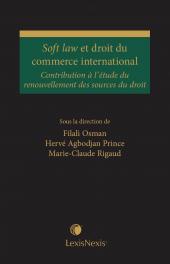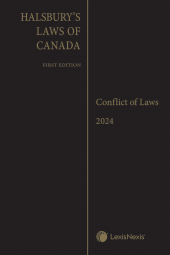Soft law et droit du commerce international
One Year Subscription Only Terms
Subscribers receive the product(s) listed on the Order Form and any Updates made available during the annual subscription period. Shipping and handling fees are not included in the annual price.
Subscribers are advised of the number of Updates that were made to the particular publication the prior year. The number of Updates may vary due to developments in the law and other publishing issues, but subscribers may use this as a rough estimate of future shipments. Subscribers may call Customer Support at 800-833-9844 for additional information.
Subscribers may cancel this subscription by: calling Customer Support at 800-833-9844; emailing customer.support@lexisnexis.com; or returning the invoice marked 'CANCEL'.
If subscribers cancel within 30 days after the product is ordered or received and return the product at their expense, then they will receive a full credit of the price for the annual subscription.
If subscribers cancel between 31 and 60 days after the invoice date and return the product at their expense, then they will receive a 5/6th credit of the price for the annual subscription. No credit will be given for cancellations more than 60 days after the invoice date. To receive any credit, subscriber must return all product(s) shipped during the year at their expense within the applicable cancellation period listed above.
Product description
Cet ouvrage est issu d'un Colloque international organisé les 11 et 12 mai 2017, à Montréal, en partenariat avec l'Université de Montréal (Centre de droit des affaires et du commerce international, CDACI), l'Université de Franche-Comté (Centre de Recherches juridiques de l'Université de Franche-Comté, CRJFC -EA 3225-) et l'Université McGill (Équipe de recherche Justice Privée et État de droit).
Les réflexions qui y sont menées visent à vérifier si l'émergence de la soft law dans le domaine du droit du commerce international est le révélateur d'un phénomène de « déjuridicisation », traduisant une concurrence « normative » entre États souverains et acteurs privés. Répondre à la question implique de partir d'une hypothèse pluraliste des systèmes juridiques et d'observer les rapports de relevance juridique entre les ordres juridiques étatiques et internationaux, d'une part, et les ordres juridiques privés, d'autre part, dans le domaine du droit du commerce international, autant dans son volet matériel que procédural. Nul doute que cette soft law se trouve à la croisée du renouvellement des sources du droit et du pluralisme juridique en matière de droit du commerce international.
Le présent ouvrage réunit les contributions de Walid Ben Hamida, Andrea K. Bjorklund, Olympe Dexant-de Bailliencourt, Ali Filali, Fabien Gélinas, Catherine Kessedjian, Béatrice Lapérou-Scheneider, Eric Loquin, Daniel Mainguy, Amissi M. Manirabona, Giacomo Marchisio, Denis Mouralis, Filali Osman, William W. Park, Hervé Agbodjan Prince, Marie-Claude Rigaud, Marwa Semhat, Lukas Vanhonnaeker et Ahmet Cemil Yıldırım.
Table of contents
Chapitre 1 – La soft law : aux confins de la morale et de la lex mercatoria (Filali Osman)
PARTIE I – SOFT LAW ET RENOUVELLEMENT DES SOURCES DU DROIT DU COMMERCE INTERNATIONAL
Chapitre 2 – Soft law, source du droit du commerce international (Denis Mouralis)
Chapitre 3 – Le droit international collaboratif – un exemple de méthode « soft » (Catherine Kessedjian)
Chapitre 4 – Le droit souple et l'usage transnational dans une perspective interactionnelle (Fabien Gélinas)
Chapitre 5 – Soft law, principes d'UNIDROIT et lex mercatoria (Ahmet Cemil Yıldırım)
Chapitre 6 – Soft Law and International Investment Law (Andrea K. Bjorklund and Lukas Vanhonnaeker)
PARTIE II – DOMAINES COUVERTS PAR LA SOFT LAW
A. Soft law, prévention et règlement des différends
Chapitre 7 – Soft law et contentieux commercial interétatique (Hervé Agbodjan Prince avec la collaboration de Marwa Semhat)
Chapitre 8 – Soft law et responsabilité pénale de l'entreprise (Amissi M. Manirabona)
Chapitre 9 – Soft law et arbitrage commercial international : l'adoption du principe de proportionnalité (Giacomo Marchisio)
Chapitre 10 – Decision-Making in Arbitration (William W. Park)
Chapitre 11 – Soft law et droit processuel de l'arbitrage international (Walid Ben Hamida)
B. Soft law et droit matériel du commerce international : illustrations
Chapitre 12 – Soft Law et droit pénal : divergences et confluences, l'exemple du droit français (Béatrice Lapérou-Scheneider)
Chapitre 13 – La soft law dans la chari'a islamique – l'exemple de la finance islamique (Ali Filali)
PARTIE III – ACTEURS ET FACTEURS D'EFFECTIVITÉ DE LA SOFT LAW
Chapitre 14 – La soft law au pluriel : jalons d'une réflexion sur les modalités (Marie-Claude Rigaud)
Chapitre 15 – La contribution du juge, du médiateur et de l'arbitre dans l'effectivité de la soft law (Daniel Mainguy)
Chapitre 16 – La contribution des autorités nationales de régulation (Olympe Dexant-de Bailliencourt)
Chapitre 17 – Rapport de synthèse (Eric Loquin)
 Lexis Nexis
Lexis Nexis 


